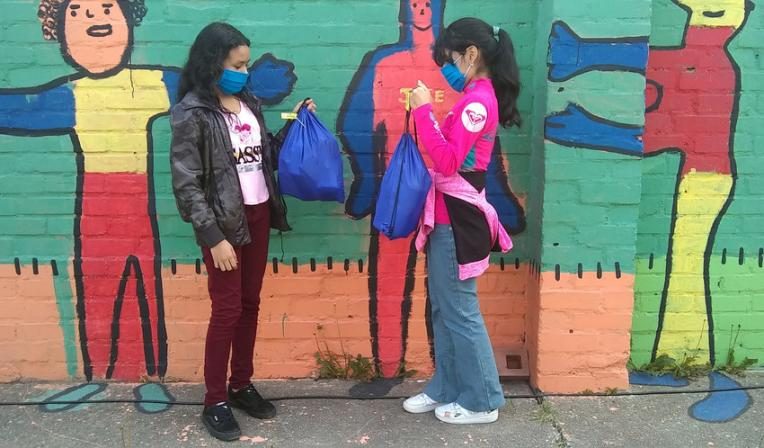8 FEBRUARY 2021
Up to two million Venezuelan girls and women in Colombia, Peru and Ecuador lack access to the resources and education needed to manage their periods.

Women and girls who have fled Venezuela’s economic and political crisis are being forced to manage their periods without basic sanitary products.
Up to two million Venezuelan adolescent girls and women may not be able to afford to menstruate with dignity, with serious consequences for their health and wellbeing.
Most have also been exposed to long journeys before reaching neighbouring countries such as Colombia, Peru and Ecuador, without sufficient access to clean water, sanitary facilities and in many cases, toilet paper.
Lack of information about periods for adolescent girls
A lack of access to education also means that many girls have their first period without information about how their bodies are developing, making them feel scared about the process.
“During my journey from Venezuela to Colombia, most of the places had no access to water or toilet paper. Now here in Colombia, we don’t have the economic resources to buy menstrual hygiene products and sometimes we have to ask relatives for money to be able to buy them.” says María Alejandra* aged 14.
“Currently there is no policy on menstrual health management and hygiene for migrants and refugees. Most women in transit only have the products they brought from Venezuela or that they are given them during their journey,” explains Anyi Morales, Coordinator of Plan International’s Regional Response to the Venezuelan Crisis.
“When they finally do manage to settle in, the socio-economic situations become so pressing that they cannot always attend to their health and menstrual hygiene needs. Also, most of them live in overcrowded conditions, so they do not have privacy or the means to have their periods normally.”
One package of sanitary towels can exceed 25% of a month’s salary
The situation is even worse in Venezuela, where the cost of one package of sanitary towels can exceed 25% of a month’s salary for those earning the minimum wage, while a box of 40 tampons can cost up to three months’ salary.
According to official data from the Venezuelan Government, the minimum monthly salary is 400,000 Venezuelan Bolivars (approximately $1.50).
A lack of clean water also has a direct impact on girls’ school attendance, with 28% of schoolchildren saying they have missed classes for this reason, according to the Venezuelan National Institute of Statistics. Worldwide, of the more than 800 million girls and women who have their period every day, more than 60% do not have what they need to menstruate with dignity, according to a study published by the consultancy FSG – Reimagining Social Change.
Period poverty hinders education
Many girls stop going to school during their periods because they do not have the products to manage it, or because their schools do not have infrastructure and access to water.
This can add up to as many as five days a month, and 45 days in a school year.
Poor menstrual hygiene can also lead to infection or diseases such as urinary tract irritation or infection and even toxic shock.
Plan International is responding to Venezuela’s migration crisis in Colombia, Ecuador, Peru, and in Venezuela through local partners, actively working for the right to dignified menstruation.
This includes training and educational workshops on the subject for migrant girls and women and delivering hygiene kits to more than 41,225 Venezuelan people in Colombia, Ecuador, Peru, and Venezuela.
The organisation has also developed educational materials designed to start conversations about menstruation and combat the taboos surrounding it.
*Name has been changed


